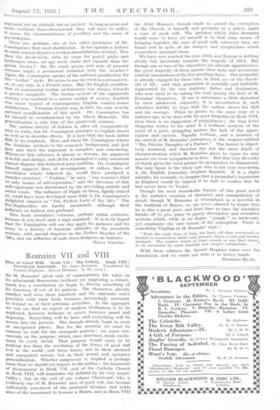Romains VII and VIII
Men of Good Will. Book VII : The Lonely. Book VIII : • Provincial Interlude. By Jules Romaine. Translated by Gerard Hopkins. (Levet Dickson. 7s. ed. each.) As M. Rornains' great epic of contemporary life takes on its substantial dimensions (without yet suggesting a climax, much less a conclusion) we begin to discern something of its direction, if not of its pattern. The characters already number well over three hundred, and the elaborate index Provided with each book becomes increasingly necessary to remind us of their previous activities. In the aggregate we can see that no aspect of modern civilization is to be neglected, however intimate or secret, however grand and imposing. Everything will be here, and everything will be woven into the pattern. The threads already begin to cross at unexpected places. But for the moment we must be Content to wait for the emergent pattern ; we must con- centrate on the purpose, which, once discerned, lends excite- ment to every detail. That purpose would seem to be nothing less than the revelation of the forces of good and evil in the world—and these forces, not in their abstract and categorical nature, but in their actual and operative Personification. Whether judgement is implied is perhaps more than we should yet impute to the author ; his treatment of freemasonry in Book VII, and of the Catholic Church in Book VIII, will scandalize the faithful by its very impar- tiality ; but at the end of one volume Clanricard, who is evidently one of M. Romains' men of good will, has become sufficiently convinced of the profound idealism and noble aims of the movement to become a Mason, and in Book VIII the Abbe Mionnet, though made to unveil the corruption of the Church, is himself, and precisely as a priest, again a man of good will. The problem which Jules Romains would seem to have set himself is to find some means of bringing together the men of good will, wherever they are found and in spite of the dangers and temptations which everywhere surround them.
We have now reached the year 1910, and Europe is drift ing slowly but inevitably towards the tragedy of 1914. But though one or two of the characters are already apprehensive, the great majority of them pursue their lusts and avocations entirely unconscious of the fate awaiting them. Our sympathy is already engaged for those who, in 1910, are on the thresh- old of life ; and that generation is carefully and faithfully represented by the two students, Jallez and Jerphanion, who now seem to be taking the lead among the host of M. Romains' characters. If one is sometimes a little disturbed by their adolescent solemnity, it is nevertheless in such relentless fidelity to type that the author shows his skill and his courage. When he passes to the same type at a maturer age, as he does with the poet Strigelius in Book VIII, then there is no suggestion of priggishness ; the long letter Strigelius writes to his sister is a brilliant analysis of the mind of a poet, struggling against the lack of due appre- ciation and success. Equally brilliant, and a measure of the stretch of M. Romains' perception, is the chapter entitled
The Private Thoughts of a Farmer." The farmer is object- ively rendered, and therefore has not the same depth of characterization which M. Romains gives to types we may assume are more sympathetic to him. But this very diversity of depth gives the total picture its perspective or chiaroscuro. The only figure in the whole epic who is not very convincing is the English journalist, Stephen Bartlett. It is a slight mistake, for example, to imagine that a journalist's reputation in England would be injured if he had to confess that he -had never been to Venice.
Though the most remarkable feature of this great novel
is the author's creation of chatraricunteirphaanndt as a is manipulation io nf detail, though M. Romains is the tradition of Balzac, we are never allowed to forget that he is also a great poet, and from time to time the narrative breaks off to give place to purely descriptive and evocative sections which, while in no degree " purple " or irrelevant, yet emphasize the epic 'nature of his conception. There is something Virgilian in M. Romains' style :
"With the early days of July, the heat, till then restrained or limited to momentary sallies and retreats, shows a safe and swollen June vanish in one final storm, strength. The restless winds of to be succeeded by more leisurely and ampler exhalations. . ."
With these volumes Mr. Gerard Hopkins takes over the translation, and we could not wish it in better hands.
HERBERT READ.,


































 Previous page
Previous page